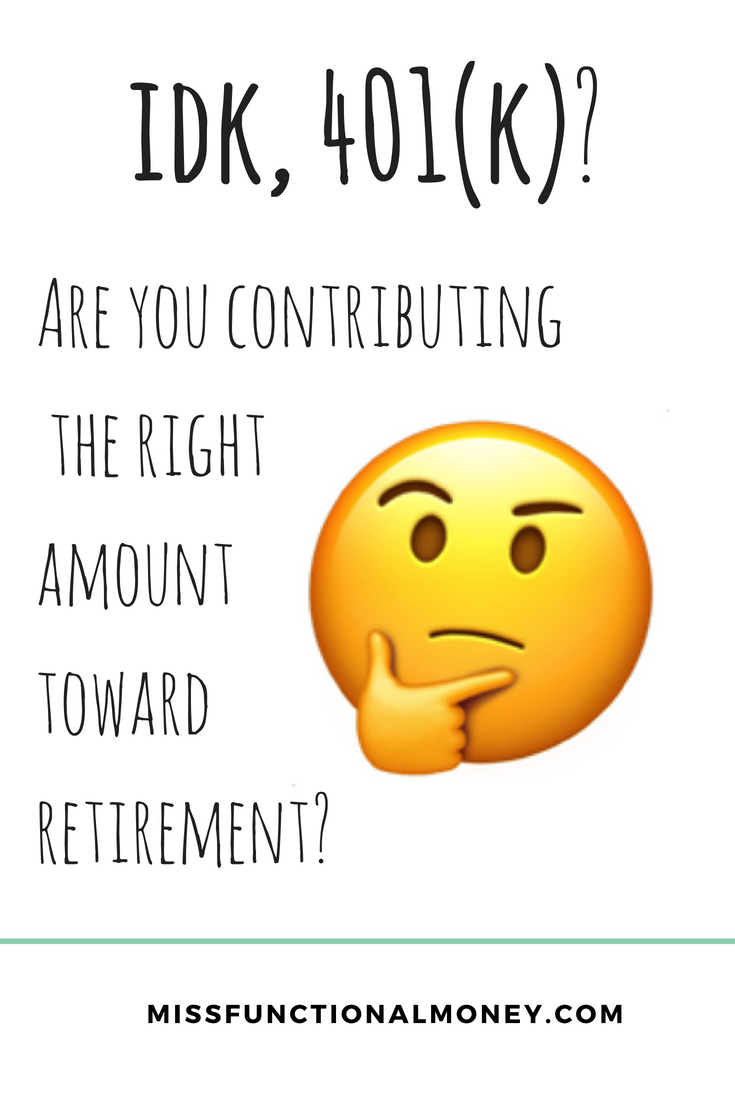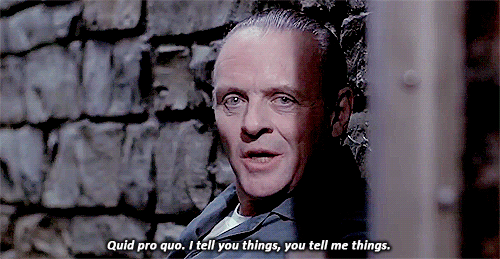How much should you contribute to your 401(k)?
Getting older is weird.
One day, you're happily climbing a tree in the back yard and the next thing you know, you have an opinion on backsplashes.
That's something I never thought I would write. I did not — not for one second — ever think I would be the type of person who cared about a backsplash. And yet here we are.
Getting older is weird, but at least you learn more and more. For example, I've learned — and quite quickly, I might add — that I do not want to work for someone else for my entire career. I don't want to work hard and stay late and build *their* bottom line. I don't want to bust my butt so that someone else can afford a Tesla and a Key West house in retirement. Because I'm not too concerned with what their retirement lifestyle looks like, but I sure as hell am thinking about mine.
UPDATED: Learn the step-by-step process I used to select my 401k investments HERE.
Retirement.
It's scary! It's wild to know I need to be thinking about it already. Reading about the long-term benefits of a tax-deferred savings account is just not something I ever thought I would opt into during my free time.
But again, here we are.
And it's intimidating! I'm planning for something that will happen four decades from now. That's so nuts! Actually, it's the most optimistic thing I've ever heard, because it means I believe I won't get hit by a bus and die tomorrow. Hope! So touching.
I know I'm not alone in this feeling because there are enough blog posts written about this subject for me to know that I'm not the only one who has sought some info. It's tricky, but we're smart. Just for seeking out answers and trying to get help — we are ahead of the game.
And I am clinging to that.
So, what are the average 401(k) contributions? Am I doing it right? Am I way behind the average 25-year-old? What's the "K" even for? Ahead, we discover (some) of the answers.
RELATED: Will You Be Prepared For Retirement?
What is a 401(k)?
A 401(k) is an employer-sponsored retirement plan that allows you to contribute part of your salary straight from your paycheck before you ever see it. These contributions may either be pre-tax or post-tax dollars depending on the type of plan that your company offers, but a "regular" 401(k) will have you contributing pre-tax, and it's called a "salary deferral".
No matter whether or not you contribute to your 401(k) before or after those dollars are taxed, their growth — or, "earnings" — will accrue on a tax-deferred basis. If you leave that money and its earnings alone until you reach age 59 1/2* you can cash out without having to pay the 10% penalty fee.
It's like a trade-off with the government. Quid pro quo. You won't have to pay taxes on this money yet, but you also can't touch it until you are 59 1/2.
And that means that you retire with more money, and the gov keeps its sticky fingers out of the equation.
Even if you wait until retirement age to start withdrawing from your 401(k), you will have to pay regular income taxes on the distributions. That's not as sexy as the Roth IRA, which allows you to cash out totally tax-free if you do it right. But, the contribution and income barriers are much higher for a 401(k), and there's the whole company match thing.
What is company matching?
The biggest perk of a 401(k) is company matching, which might as well be called the Free Money Program That You're Nuts Not to Utilize.
It's common for organizations to match a certain percentage of an employee's salary if they participate in a 401(k) program. Company matching is a beautiful thing because it's like a high-five that says "Hey, champ! I also believe in your future! It's looking bright! Keep it up! :) :) :)" In an age where retirement plans aren't getting any better, company matching is often used as a recruitment tactic and incentive for employees to stay.
Unfortunately, matching isn't a free-for-all where you can contribute half of your salary and have your company also match half of your salary.
(Although, how wild would that be?! I'd already be shopping for my yacht if that were the case.)
According to Investopedia, the most common employer match is 50 cents on the dollar of up to 6% of your salary. In other words, if you make 40,000 per year and contribute the full 6% of your salary ($2,400), then that employer would also throw $1,200 in the pot. That brings your total contribution for the year to $3,600. You could contribute more than 6%, but your employer would max out their match at $1,200.
Other companies offer matching of 100% of your contributions up to a lower percentage, like perhaps 4%. So if you make $40,000 per year and still contribute 6% of your salary ($2,400), then your company would match your contribution in full up to 4% ($1,600). That brings your total for the year to $4,000.
There are many, many ways that companies approach this, and it will vary based on where you work, how the company is performing in that particular year, if they are government subsidized, etc.
As of 2018, you can contribute a maximum of $18,500 per tax year. If you're over age 50, your limit is $24,500. And that's just your money from your paycheck — your employer's matching dollars do not count toward that limit.
Your *total* 401(k) contributions — from yourself and your employer — cannot exceed $55,000 (or 100% of your compensation, whichever is less) if you are under age 50. The ceiling is slightly higher for those age 50 or older with a $61,000 combined total limit.
No matter what exactly your company's plan is, what your other retirement accounts look like, or how long you plan to stay in your current role, most financial analysts agree that you should contribute *at least* what your employer will match. If they offer dollar-for-dollar up to 3%, you should put in a minimum of 3% to get the match. Otherwise, you're just leaving free money on the table!
What happens if I withdraw from my 401(k) earlier than age 59 1/2?
There are consequences.
Such consequences.
Although it is available to you, if you withdraw from your 401(k) before retirement, you will have to pay taxes on the distributions PLUS you will typically have to pay a 10% early-withdrawal fee. So, if you want to withdraw $10,000 at age 31 for a new jet ski, you would immediately lose $1,000 just in fees. Plus, you'll lose a large portion just to taxes — so depending on your tax bracket, you'll maybe walk away with about $6,600 of your original $10K. I'm not a math queen, but ... I feel like you lose in this situation. A lot.
Actual footage of the IRS.
Because you're not just deleting $10,000 from your future self's retirement savings, you are also eliminating any/all potential earnings from that money. As this article points out, because 401(k) investments average 7% per year over time, that $10,000 you take out at age 31-32 could have grown to about $75,000 by age 60.
So maybe rethink the jet ski.
In all seriousness, there are certain scenarios when people feel desperate and want to tap into that money that is theirs to avoid credit card debt or buy a house. And you can. However, experts agree that the best course of action is to leave your 401(k) untouched until retirement, and only withdraw early if you have exhausted all other options.
What if I quit my current job — do I lose my 401(k) earnings?
No.
That's the short answer. Most people opt to roll their 401(k) into a traditional IRA account. The ins and outs of that may constitute its own post, along with what to do if you are an independent contractor or self-employed person. (Would that type of content be useful for you? Let me know in the comments below!)
RELATED: Is A Traditional IRA Right For You?
How much should I contribute to my 401(k)?
Many financial experts suggest saving between 15-20% of your total gross earnings for retirement, but that doesn't all have to be in your 401(k). It could also include your Roth IRA, traditional IRA or other taxable savings accounts. Of course, that number is not hard and fast. The 80/20 rule is a safe, average number to work with, but it could also wind you up with a safe, average life of working until you're 65. Determine you individual goals, and then make your own decision about how much to put away for later. Obviously, saving much more aggressively now means you get to retire earlier if you want to.
Vanguard's 2017 Report of How America Saves is a very long, very in-depth, but very revealing study that includes what the average American puts into their 401(k).
In 2016:
The average 401(k) contribution in 2016 was 6.2%. Including the employer's match, the average contribution was 10.9% (median age 45).
The folks at Fidelity reported slightly higher numbers: 8.4% of paycheck contributions on average, and 12.9% when you factor in employee matches. (I don't know why that number is so different but am very curious — maybe their demographic is slightly older?)
Unsurprisingly, the Vanguard report showed that 401(k) contribution levels are higher when the employee is older or at a higher income levels.
Employees earning less than $30,000 contributed an average 3.9% of pay
Employees earning more than $100,000 contributed an average of 8.1% of pay
Millennials (age 25-34) contribute an average of 5.3% of their pay
People age 55-64 (aka people who are gearing up to retire soon) contributed 7.4%
Currently, I contribute slightly above the average millennial. I guess if we want to not live an average life with an average retirement, we need to crank up contributions and savings to above average. As Dave Ramsey always says:
Live like no one else now, and later you can live like no one else.
What're the most important things to remember?
The most crucial savings/retirement/FIRE/money advice is this: Start. Just start! Start contributing whatever percentage you can — no matter how small — and grow from there. You'd be surprised what you can survive without. Because they take 401(k) savings straight from your paycheck, you never see them. And you never miss them.
Contribute at least as much as your employer matches. Don't leave free money on the table.
When you get a raise, give your savings a raise. Knock that 401(k) up by one or two percent — since you're used to living without it, you won't miss it.
So there it is — your down and dirty guide to 401(k) savings. Remember that this is all just reporting on what the average looks like and generally which direction you should head.
In my opinion, that general direction is away from a desk and a boss and toward a hammock.
Keep researching, keep digging, and keep working toward saving for a life that offers freedom and flexibility. What are your current retirement savings plans? Do you have any 401(k) struggles? Does anyone wish they'd named 401(k)s something a little more spicy? Let me know in the comments below and we can compare notes!
*Who decided that 59.5 was the magic number? The half year really throws me. I don't understand. Why does six more months make me ready to retire? Why not call it an even 60? I feel like there's a real reason, and I can't find it. Halp.
















Raise your hand if you’ve ever felt personally victimized by a snooze-worthy company-wide meeting on HR policy and updates. I know, I know, it’s boring, but also exciting because think of all the money you’ll have when you’re 80! Whoooohhooo! Here are the things I considered when selecting my retirement fund.